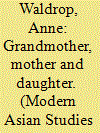|
|
|
Sort Order |
|
|
|
Items / Page
|
|
|
|
|
|
|
| Srl | Item |
| 1 |
ID:
155757


|
|
|
|
|
| Summary/Abstract |
Framed within a discussion of boundary work and its many facets, this article develops a critical understanding of the discourses that shape the material and symbolic hierarchies of power asserted by employers of domestic workers in Indian households. We analyze the nature of discourses that are mobilized in the boundary work practiced by different groups of employers in India as they negotiate their relationships with their domestic workers. Drawing on fieldwork in Mumbai and Chennai, our analysis outlines two different discourses within the nature of boundary work – one centered on the trope of benevolent maternalism and another which mobilizes a market-based trope – and delineate how these diverge and converge in the relationship between employers and domestic workers. We also show how these discourses differ according to two key factors: on the one hand, whether the employers hire full-time or part-time workers, and on the other hand, the specific positional attributes of the employers in terms of age, occupation, and family background. We argue that these two discursive categories are not watertight compartments, but are located on a spectrum, and that employers therefore exhibit elements of both maternalism and market-based approaches within the relationship with their workers.
|
|
|
|
|
|
|
|
|
|
|
|
|
|
|
|
| 2 |
ID:
112481


|
|
|
|
|
| Publication |
2012.
|
| Summary/Abstract |
Covering one hundred years, this paper recounts the life stories of three generations of middle-class women of the New Delhi-based Kapoor family. By taking the methodological view that individuals born approximately at the same time, within the same class segment, and at the same cultural place will be shaped by the same historical structures so that their lives to some extent are synchronized into a gendered, generational experience, these three life stories are viewed as voices that reflect their respective generational class segments. In view of this, the paper uses the three life stories to discuss changes in women's agency within the urban, educated, upper middle-class. Agency is here understood as control over resources, and it is argued that in order to understand changes in women's agency, one should take into account the impact of both social, economic structures and cultural ideologies. When analysing the three life stories, the overall finding is that the granddaughter has had more control over her own life than her mother and grandmother. However, by acknowledging that cultural ideologies and social economic structures are not always synchronized, a nuanced and many-dimensional picture of twists and turns in these middle-class women's degree and type of agency over time emerges.
|
|
|
|
|
|
|
|
|
|
|
|
|
|
|
|
|
|
|
|
|